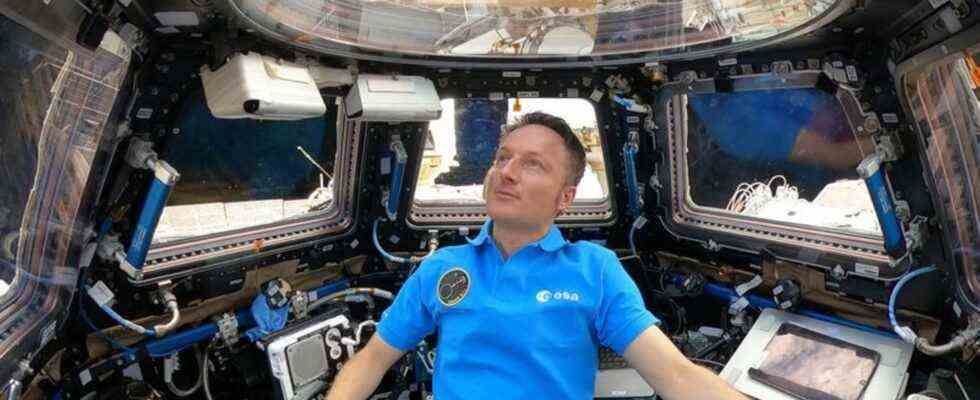space
ISS halftime for astronaut Maurer: moon flight “big dream”
Astronaut Matthias Maurer looks at Earth from the dome of the International Space Station ISS. Photo: NASA/ESA-M.Maurer/dpa
© dpa-infocom GmbH
A good half of his time on the ISS space station is over for Matthias Maurer. For Europe’s ex-space chief Jan Wörner, the mission also has a political aspect in the midst of the Ukraine crisis.
After a good three months in space, astronaut Matthias Maurer is clear: he would like to go even higher in space.
“Walking on the moon and exploring the moon will definitely remain a big dream – and of course I hope that this dream will come true,” the 51-year-old told dpa halfway through his mission on the International Space Station ( ISS). The Esa astronaut, who traveled to the outpost of humanity on November 11 with three colleagues from the US space agency Nasa, is scheduled to return to Earth at the end of April.
“We still have work to do”
He learned a lot in the laboratory at an altitude of around 400 kilometers that he didn’t expect, says the Saarlander. “I actually thought you were a bit more autonomous on the road.” But you need the support of the ground teams “almost constantly” to implement the experiments. “We still have a bit of work to do on how to implement this on the moon,” says Maurer.
For future missions to Mars, for example, “you have to think about something, because it can take up to 20 minutes for a radio message from Mars to reach Earth. And then of course another 20 minutes until you have the answer”. The moon is only a few days flight time away from the earth – the red planet, however, many months.
Maurer is currently involved in around 150 experiments in the “space community”. For example, plants would be grown in zero gravity. An important attempt, also for trips to the moon and Mars – to be able to produce fresh food on site. And new materials are being tested. “The experiments are all going extremely well.” But he himself is only “the executor” and does not evaluate the experiments – that’s what scientists did on the ground, who also “designed them and then sent them up”.
“So far, almost all experiments have worked,” says Volker Schmid, who is responsible for the mission at the German Aerospace Center (DLR). “Here and there there were small changes in the schedule, but that’s normal.” Halfway through, the focus was already on the planned field assignment: Maurer is expected to work outdoors for several hours in April. “His job would be to prepare the European robotic arm for operation,” says Schmid. Maurer’s three German predecessors on the ISS also had external missions.
The so-called space walk is “still on the agenda,” says Maurer. “But as is often the case in space travel, there are of course a few question marks.” There is still work to be done in order for this to happen. “But I’m very optimistic.”
Maurer feels “at home”
The 51-year-old from Oberthal still feels “at home on the ISS”, as he says. “Actually, I don’t really miss anything.” Of course he would like to jump into the water and wash himself or eat fresh fruit and salad. But time goes by so quickly. “That’s incredible. I’m almost a little nostalgic that I’m halfway through my mission.”
Europe’s former space chief Jan Wörner hopes Maurer’s enthusiasm is contagious. “Esa flights are not about personal adventures, but people remain indispensable as mediators of fascination and motivation,” says the former Director General of the European space agency Esa. A human can also describe the beauty, fragility and condition of the earth more intensively than, say, a space probe.
Space travel has a political aspect
The current President of the German Academy of Science and Engineering refers to another aspect: “Human space travel also has a geopolitical effect.” In the midst of the Ukraine crisis, Maurer is currently working with four Americans and two Russians on the ISS. “Astronauts from different countries bridge the tensions on Earth.”
At the weekend, Maurer completed 100 days on the ISS. What he initially noticed was that it takes a certain amount of time to adjust to weightlessness, says the astronaut. The brain needs “significantly more storage space” to find its way in three-dimensional space. “For normal work and thinking, you then have a little less brain capacity than I originally thought.” That’s why he often made small mistakes in the experiments at the beginning. It was good that the ground staff looked “over his shoulder”.
For his 52nd birthday on March 18, he is planning a nice meal on the space station. That day, three Russian cosmonauts are expected from Earth in the evening, so there will be ten of them. “Then I’ll have to make sure I still have enough food here. Of course I want to serve the best – a bit of Saarland.”

